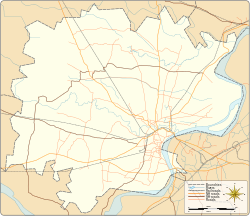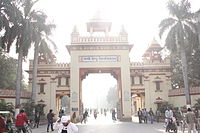 Faculty of SVDV | |
| Type | Faculty |
|---|---|
| Established | 1918 |
Parent institution | Banaras Hindu University |
| Dean | Prof. Kamlesh Jha |
| Location | , , India 25°16′04″N82°59′29″E / 25.26772°N 82.991258°E |
| Campus | Urban |
| Affiliations | UGC |
| Website | Official website |
Faculty location on Varanasi district map | |
Faculty of Sanskrit Vidya Dharma Vijnan is a faculty of Banaras Hindu University (BHU) in the city of Varanasi in India. The Faculty of Sanskrit Vidya Dharma Vijnan, also called SVDV, or the Faculty of SVDV, offers bachelor's, master's and doctoral degrees in the studies of ancient Indian Shastra, Sanskrit language and Sanskrit literature. It was founded by Mahamana Pandit Madan Mohan Malviya in 1918. [1]



